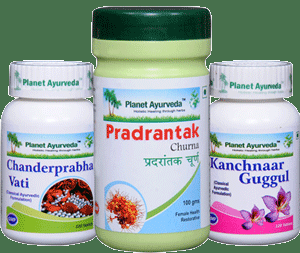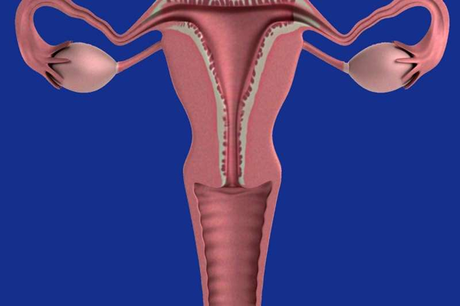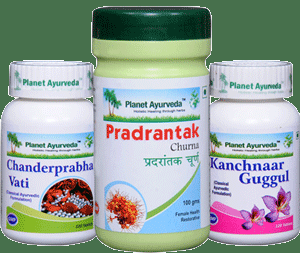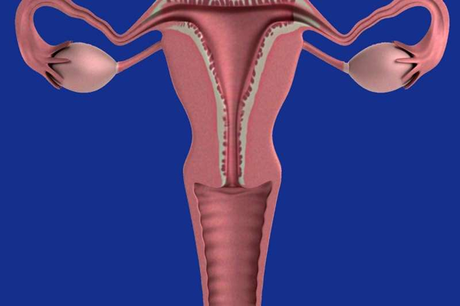Ovarian Cysts: It is often seen that a huge proportion of the female population is suffering from the problem of Ovarian Cyst. As most of the people know that Ovaries are the most important part of the woman's reproductive system. Ovaries are the reproductive parts that are located in the lower side of Abdomen on both sides of the Uterus in females. Each and every female has two ovaries. Both these ovaries produce Progesterone and Estrogen hormones and also produce Eggs. Every woman at least one time in their life may suffer from the disorder of Ovarian Cyst. The cyst usually develops when one fluid-filled sac develops on the surface of Ovary. Sometimes this Single Cyst may cause the problem of Multiple Cysts. The problem of Multiple Cysts is also called PolyCystic Ovarian Syndrome i.e. PCOS. These cysts are present in the female body and do not show any signs but most of the time these cysts are very painful. Cysts may vary in their size but if these Cysts become excessively large in size then they may cause Discomfort or Menstrual Irregularities.
Types of Ovarian Cysts
Ovarian Cysts are mainly classified into two types: Functional ovarian cysts and Abnormal ovarian cysts. These main types are further divided into many sub-types depending upon the cause of cysts and their characteristics.
A. Functional Ovarian Cysts
The first main type of ovarian cyst is Functional ovarian cysts. This type of ovarian cysts is commonly occurred due to small alterations in the normal functioning of female ovaries. This minor alteration may occur due to an imbalance of hormones which may further cause Dysmenorrhea, Irregular menstrual cycle or Painful menstrual flow. This type of ovarian cysts is further divided into two types:
1. Luteal Cysts
The luteal cysts usually appear after ovulation or you can say during the second half of the menstrual cycle. During the normal cycle the egg is released from the follicle which develops into the corpus luteum. This corpus luteum normally produces the progesterone in the female body but during this condition, it is filled with fluid or blood which lead to the formation of cyst.
2. Follicular Cysts
This type of cysts usually develop before ovulation or you can say during the first half of the menstrual cycle. During this condition, the egg remains inside the follicle which continues to grow and become enlarged after some time due to the presence of fluid inside it. Follicular Cysts do not show any symptoms.
B. Abnormal Ovarian Cysts
Abnormal growth of cells is the main reason behind this type of cysts. Sometimes, Abnormal Cysts develop on the outer side of the ovaries and after its development, it grows bigger in size and then gets attacked by a stem to the ovary. Abnormal Ovarian Cysts are also known as Cystadenoma of ovaries.
These cysts are further divided into three types:
1. Polycystic Ovaries
This condition mainly arises due to the imbalance of hormones and in this condition, a large number of cysts develop inside the ovaries. The condition of Polycystic ovaries is also known as PCOS.
2. Teratoma Cysts or Dermoid Cysts
These cysts are not normal cysts, they are basically tumors that are filled with the pieces of Teeth, Skin, bone, and Hair. These cysts have the ability to become malignant.
3. Endometrial Cysts
During this condition, Endometrial patches/cysts that are filled with old blood form on the surface of the ovaries. These types of cysts are also called Chocolate cysts.
Symptoms of Ovarian Cyst
Usually, Ovarian Cyst present in females does not show any symptoms but some signs and symptoms are very common when Ovarian Cyst starts growing. Few of the signs and symptoms that may occur during the growth of Ovarian Cyst are as follows:
● Vomiting
● Nausea
● Painful intercourse
● Tenderness of Breast
● Painful Bowel Movements
● Abdominal Swelling or Bloating.
● Excess pain in the Thighs or Lower back.
Ovarian Cyst may also cause severe symptoms. These Symptoms require Immediate Medical Treatment. Some severe symptoms include:
● Fever
● Dizziness
● Rapid breathing
● Faintness
● Severe Pain in the Belly.
● Severe or Sharp Pelvic Pain during or before the Menstrual Cycle.
All the above-mentioned symptoms can indicate that cyst is ruptured and it may cause some serious problems if not treated in time.
Diagnosis of Ovarian Cyst
The presence of Cyst is usually detected with the help of the pelvic examination. Each and every cyst may vary in size. Sometimes these cysts are filled with fluid or sometimes they are in solid form. Depending on its type doctor will recommend some tests for the proper confirmation of the type of Cyst. Some common tests include:
1. Pregnancy Test
With the help of this test, the doctor may check the presence of Corpus Luteum Cyst.
2. Laparoscopy
In this test, a slim and lighted instrument is inserted in the abdomen of the infected females through a small incision. A camera is attached to the top of the lighted instrument through which a doctor may detect the ovarian cyst and after its final detection, the physician may remove the ovarian cyst at the same time after giving some dose of Anaesthesia.
3. Pelvic Ultrasound
In this test, a transducer is used to send as well as to receive the Ultrasound Waves. These waves create images of ovaries from different sides on the screen. Then the physician may analyze the images to confirm the presence and location of the cyst.
Management of Ovarian Cyst
After reading the above article, you should be thinking about how Ovarian Cyst should be managed. Basically, most of the Allopathic doctors recommend some control pills to prevent the growth of Ovarian Cyst but these pills do not remove the already present cyst inside the body. Whereas, Allopathic doctors suggest that patients should undergo surgery for the permanent removal of Ovarian Cyst. But this is not a suitable method for its management. However, Ovarian Cyst can be easily managed without any surgery with the help of the Anti-Ovarian Cyst Pack of Planet Ayurveda. Planet Ayurveda which is the leading and one of the most trusted companies of Ayurvedic remedies prepares Anti-Ovarian Cyst Pack with the help of pure and natural herbs. This Anti-Ovarian Cyst Pack is completely free from Harmful Additives and Preservatives. This pack does not contain any Sweetening and Coloring agent. Apart from this, Anti-Ovarian Cyst Pack does not produce any adverse effects in the body.
Anti-Ovarian Cyst Pack contains the following products:
1. Chanderprabha Vati
2. Pradrantak Vati
3. Kachnaar Guggul


1. Chanderprabha Vati
Chanderprabha Vati are prepared from various types of herbs such as Haridra (Curcuma longa), Vidanga (Embelia Ribes), Guggul (Commiphora Mukul), Vacha (Acorus calamus), Pippali (Piper longum), Maricha (Piper nigrum), Giloy (Tinospora cordifolia) and Mustak (Cyperus rotundus), etc. All the herbs that are used in the formulation of Chanderprabha vati tablets are very useful in the management of symptoms that are associated with Leucorrhoea, Uterine Fibroids, PMS and ovarian cysts, etc.
Dosage: 2 Tablets 2 times a day after meals with plain water.
2. Pradrantak Churna
Pradrantak churna is available in the form of powder and formulated from herbs such as Ashok (Saraca indica), Arjuna (Terminalia arjuna), Udumbur (Ficus glomerata), and Lodhra (Symplocos racemosa), etc. This churna maintain the overall reproductive health of females and treat the major problems of Painful Menstruation, Uterine Fibroids, and premenstrual syndrome.
Dosage: 1 teaspoonful powder 2 times a day after meals with plain water.
3. Kachnaar Guggul
These tablets reduce the size of cysts and also remove it easily from the body without any surgery. The herbs used in the preparation of these tablets include Bibhitaki (Terminalia bellerica), Ginger (Zingiber officinale), Kachanar bark (Bauhinia variegata), Haritaki (Terminalia chebula), Guggul (Commiphora mukul) and Amalaki (Emblica officinalis). The tablets of Kanchnaar Guggul shows very effective results against various types of ovarian cysts.
Dosage: 2 Tablets 3 times a day after meals with plain water.
FAQs
Q. What symptoms may occur if a female is suffering from Ovarian Cyst?
A. Some common symptoms of Ovarian Cyst include Vomiting, Nausea, Painful intercourse, Tenderness of Breast, Painful Bowel Movements, Abdominal Swelling or Bloating, Fever, Dizziness, Rapid breathing, Faintness, Severe Pain in the Belly?
Q. What causes the pain of the Ovarian Cyst to occur?
A. Stretching, Rapid growth or Rupturing of the cyst may cause pain.
Q. How are Ovarian cysts detected?
A. Ovarian cysts are detected with the help of pelvic examination, Pregnancy test, Laparoscopy, and Pelvic ultrasound.
Q. Ovarian cysts can be treated without surgery or not?
A. Yes, it can be managed without surgery with the help of Ayurvedic remedies.
DR. Vikram Chauhan, MD - AYURVEDA is an expert ayurvedic doctor based in Chandigarh, India and doing his practice in Mohali, India. He is spreading the knowledge of Ayurveda - Ancient healing treatment, not only in India but also abroad. He is the CEO and Founder of Planet Ayurveda Products, Planet Ayurveda Clinic and Krishna Herbal Company. Write at - [email protected], Contact at - +91-172-521-4030 Websites - www.planetayurveda.com, www.alwaysayurveda.com
View more posts from this authorOvarian Cysts: It is often seen that a huge proportion of the female population is suffering from the problem of Ovarian Cyst. As most of the people know that Ovaries are the most important part of the woman's reproductive system. Ovaries are the reproductive parts that are located in the lower side of Abdomen on both sides of the Uterus in females. Each and every female has two ovaries. Both these ovaries produce Progesterone and Estrogen hormones and also produce Eggs. Every woman at least one time in their life may suffer from the disorder of Ovarian Cyst. The cyst usually develops when one fluid-filled sac develops on the surface of Ovary. Sometimes this Single Cyst may cause the problem of Multiple Cysts. The problem of Multiple Cysts is also called PolyCystic Ovarian Syndrome i.e. PCOS. These cysts are present in the female body and do not show any signs but most of the time these cysts are very painful. Cysts may vary in their size but if these Cysts become excessively large in size then they may cause Discomfort or Menstrual Irregularities.

Types of Ovarian Cysts
Ovarian Cysts are mainly classified into two types: Functional ovarian cysts and Abnormal ovarian cysts. These main types are further divided into many sub-types depending upon the cause of cysts and their characteristics.
A. Functional Ovarian Cysts
The first main type of ovarian cyst is Functional ovarian cysts. This type of ovarian cysts is commonly occurred due to small alterations in the normal functioning of female ovaries. This minor alteration may occur due to an imbalance of hormones which may further cause Dysmenorrhea, Irregular menstrual cycle or Painful menstrual flow. This type of ovarian cysts is further divided into two types:
1. Luteal Cysts
The luteal cysts usually appear after ovulation or you can say during the second half of the menstrual cycle. During the normal cycle the egg is released from the follicle which develops into the corpus luteum. This corpus luteum normally produces the progesterone in the female body but during this condition, it is filled with fluid or blood which lead to the formation of cyst.
2. Follicular Cysts
This type of cysts usually develop before ovulation or you can say during the first half of the menstrual cycle. During this condition, the egg remains inside the follicle which continues to grow and become enlarged after some time due to the presence of fluid inside it. Follicular Cysts do not show any symptoms.
B. Abnormal Ovarian Cysts
Abnormal growth of cells is the main reason behind this type of cysts. Sometimes, Abnormal Cysts develop on the outer side of the ovaries and after its development, it grows bigger in size and then gets attacked by a stem to the ovary. Abnormal Ovarian Cysts are also known as Cystadenoma of ovaries.
These cysts are further divided into three types:
1. Polycystic Ovaries
This condition mainly arises due to the imbalance of hormones and in this condition, a large number of cysts develop inside the ovaries. The condition of Polycystic ovaries is also known as PCOS.
2. Teratoma Cysts or Dermoid Cysts
These cysts are not normal cysts, they are basically tumors that are filled with the pieces of Teeth, Skin, bone, and Hair. These cysts have the ability to become malignant.
3. Endometrial Cysts
During this condition, Endometrial patches/cysts that are filled with old blood form on the surface of the ovaries. These types of cysts are also called Chocolate cysts.
Symptoms of Ovarian Cyst
Usually, Ovarian Cyst present in females does not show any symptoms but some signs and symptoms are very common when Ovarian Cyst starts growing. Few of the signs and symptoms that may occur during the growth of Ovarian Cyst are as follows:
● Vomiting
● Nausea
● Painful intercourse
● Tenderness of Breast
● Painful Bowel Movements
● Abdominal Swelling or Bloating.
● Excess pain in the Thighs or Lower back.
Ovarian Cyst may also cause severe symptoms. These Symptoms require Immediate Medical Treatment. Some severe symptoms include:
● Fever
● Dizziness
● Rapid breathing
● Faintness
● Severe Pain in the Belly.
● Severe or Sharp Pelvic Pain during or before the Menstrual Cycle.
All the above-mentioned symptoms can indicate that cyst is ruptured and it may cause some serious problems if not treated in time.
Diagnosis of Ovarian Cyst
The presence of Cyst is usually detected with the help of the pelvic examination. Each and every cyst may vary in size. Sometimes these cysts are filled with fluid or sometimes they are in solid form. Depending on its type doctor will recommend some tests for the proper confirmation of the type of Cyst. Some common tests include:
1. Pregnancy Test
With the help of this test, the doctor may check the presence of Corpus Luteum Cyst.
2. Laparoscopy
In this test, a slim and lighted instrument is inserted in the abdomen of the infected females through a small incision. A camera is attached to the top of the lighted instrument through which a doctor may detect the ovarian cyst and after its final detection, the physician may remove the ovarian cyst at the same time after giving some dose of Anaesthesia.
3. Pelvic Ultrasound
In this test, a transducer is used to send as well as to receive the Ultrasound Waves. These waves create images of ovaries from different sides on the screen. Then the physician may analyze the images to confirm the presence and location of the cyst.
Management of Ovarian Cyst
After reading the above article, you should be thinking about how Ovarian Cyst should be managed. Basically, most of the Allopathic doctors recommend some control pills to prevent the growth of Ovarian Cyst but these pills do not remove the already present cyst inside the body. Whereas, Allopathic doctors suggest that patients should undergo surgery for the permanent removal of Ovarian Cyst. But this is not a suitable method for its management. However, Ovarian Cyst can be easily managed without any surgery with the help of the Anti-Ovarian Cyst Pack of Planet Ayurveda. Planet Ayurveda which is the leading and one of the most trusted companies of Ayurvedic remedies prepares Anti-Ovarian Cyst Pack with the help of pure and natural herbs. This Anti-Ovarian Cyst Pack is completely free from Harmful Additives and Preservatives. This pack does not contain any Sweetening and Coloring agent. Apart from this, Anti-Ovarian Cyst Pack does not produce any adverse effects in the body.
Anti-Ovarian Cyst Pack contains the following products:
1. Chanderprabha Vati
2. Pradrantak Vati
3. Kachnaar Guggul


1. Chanderprabha Vati
Chanderprabha Vati are prepared from various types of herbs such as Haridra (Curcuma longa), Vidanga (Embelia Ribes), Guggul (Commiphora Mukul), Vacha (Acorus calamus), Pippali (Piper longum), Maricha (Piper nigrum), Giloy (Tinospora cordifolia) and Mustak (Cyperus rotundus), etc. All the herbs that are used in the formulation of Chanderprabha vati tablets are very useful in the management of symptoms that are associated with Leucorrhoea, Uterine Fibroids, PMS and ovarian cysts, etc.
Dosage: 2 Tablets 2 times a day after meals with plain water.
2. Pradrantak Churna
Pradrantak churna is available in the form of powder and formulated from herbs such as Ashok (Saraca indica), Arjuna (Terminalia arjuna), Udumbur (Ficus glomerata), and Lodhra (Symplocos racemosa), etc. This churna maintain the overall reproductive health of females and treat the major problems of Painful Menstruation, Uterine Fibroids, and premenstrual syndrome.
Dosage: 1 teaspoonful powder 2 times a day after meals with plain water.
3. Kachnaar Guggul
These tablets reduce the size of cysts and also remove it easily from the body without any surgery. The herbs used in the preparation of these tablets include Bibhitaki (Terminalia bellerica), Ginger (Zingiber officinale), Kachanar bark (Bauhinia variegata), Haritaki (Terminalia chebula), Guggul (Commiphora mukul) and Amalaki (Emblica officinalis). The tablets of Kanchnaar Guggul shows very effective results against various types of ovarian cysts.
Dosage: 2 Tablets 3 times a day after meals with plain water.
FAQs
Q. What symptoms may occur if a female is suffering from Ovarian Cyst?
A. Some common symptoms of Ovarian Cyst include Vomiting, Nausea, Painful intercourse, Tenderness of Breast, Painful Bowel Movements, Abdominal Swelling or Bloating, Fever, Dizziness, Rapid breathing, Faintness, Severe Pain in the Belly?
Q. What causes the pain of the Ovarian Cyst to occur?
A. Stretching, Rapid growth or Rupturing of the cyst may cause pain.
Q. How are Ovarian cysts detected?
A. Ovarian cysts are detected with the help of pelvic examination, Pregnancy test, Laparoscopy, and Pelvic ultrasound.
Q. Ovarian cysts can be treated without surgery or not?
A. Yes, it can be managed without surgery with the help of Ayurvedic remedies.


